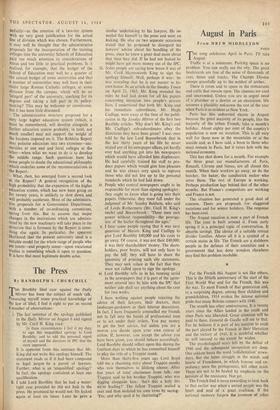The Press
By RANDOLPH S. CHURCHILL
rFIE Boothby libel case against the Daily Mirror has been the subject of much talk. possessing myself some practical knowledge of the law of libel, I feel it right to put on record a number of observations: i. The last sentence of the apology published in the Daily Mirror on August 6 and signed by Mr. Cecil H. King read : In these circumstances I feel it my duty to sign this unqualified apology to Lord Boothby, and to add the personal regret of myself and the directors of IPC that the story appeared.
It is apparent from this sentence that Mr. King did not write this apology himself. The statement reads as if it had been composed in legal jargon by a parcel of lawyers. Further, what is an !unqualified' apology? In fact, the apology contained at least one qualification.
I told Lord Boothby that he had a water- tight case provided he did not leak to the press. He promised he would not. He leaked again at least six times. Later he gave a
similar undertaking to his lawyers. He re- vealed this himself to the press and went on
leaking. He also on two separate occasions stated that he proposed to disregard his lawyers' advice about his handling of the press, since he knew a great deal more about that than they did. If he had not leaked he might have got more money out of the IPC.
iii. Some people are saying how brave it was of Mr. Cecil Harmsworth King to sign the apology himself. Well, perhaps it was: he
was revealing that he is not master in his own house. In an article in the Sunday Times
on April 21, 1963, Mr. King revealed the rules he had laid down for all his papers concerning intrusion into people's private lives. I understand that both Mr. King and his immediate subordinate, Mr. Hugh Cudlipp, were away at the time of the publi-
cation in the Sunday Mirror of the first two
Boothby articles. Why don't Mr. King's and Mr. Cudlipp's sub-subordinates obey the directions they have been given? I was once told by the late Lord Beaverbrook that in the last thirty years of his life he never visited any of his newspaper offices, yet hardly ever had anything got into his newspapers which would have afforded him displeasure.
He had carefully trained his staff to pro- duce papers which would give him pleasure and he was always very quick to reprove those who did not live up to the personal standards which he had laid down.
iv. People who control newspapers ought to be responsible for more than signing apologies: they ought to know what is going into their papers. Otherwise, they must fall under the judgment of Mr. Stanley Baldwin, who said of Lords Rothermere (Mr. Cecil H. King's uncle) and Beaverbrook: 'These men seek power without responsibility—the preroga- tive of the harlot throughout the ages.'
v. I hear some people saying that it was very generous of Messrs. King and Cudlipp to give Lord Boothby £40,000 and his costs to go away. Of course, it was not their £40,000; it was their shareholders' money. The share- holders, poor brutes, will not only have to
pay the bill; they will have to share the ignominy of printing such vile statements. They may seek solace in the fact that they were not called upon to sign the apology.
vi. Lord Boothby tells us in his running serial in the newspapers that it is part of the agree- ment entered into by him with the IPC that neither side shall say anything about the case for two weeks.
I have nothing against people rejecting the advice of their lawyers, their doctors, their landscape-gardeners or their interior decorators.
In fact, I have frequently counselled my friends not to fall into the hands of professional men
or to act under their orders. You pay money to get the best advice, but unless you are a moron you decide upon your own course of aCtion. If, however, you accept the advice you have been given, you should behave accordingly. Lord Boothby should reflect upon this during the fourteen days to which he has committed himself to play the role of a Trappist monk.
More than thirty-five years ago Lord Boyd told me a charming story about Trappist monks who vow themselves to lifelong silence. After five years of total abstinence from talk, one Trappist said to his brother Trappist, who was digging alongside him: 'Isn't this a holy life We're leading?' The fellow Trappist waited a year and then violated his own vows by saying: 'Yes; and why spoil it by chattering?'




























 Previous page
Previous page